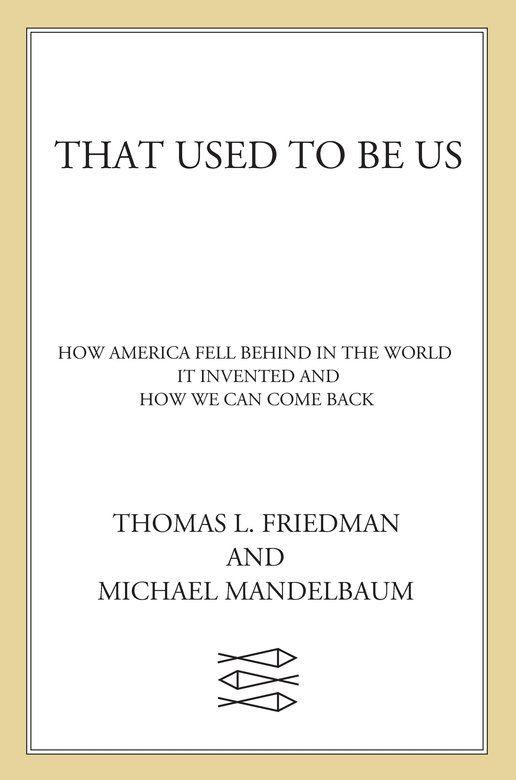
That Used to Be Us
How America Fell Behind in the World It Invented and How We Can Come Back
کتاب های مرتبط
- اطلاعات
- نقد و بررسی
- دیدگاه کاربران
نقد و بررسی

September 5, 2011
Reflecting on America's past greatness and its slipping position among global powers, Pulitzer-Prize winning New York Times columnist Friedman (The World is Flat) and foreign policy expert Mandelbaum (The Frugal Superpower) warn against the United States' "dangerous complacency" in the face of increasingly complex global challenges. They repeat a question first posed by Bill Gates ("What was all that good stuff we had that other people copied?") and prescribe a set of sensible government practices for prosperity: invest in public education and infrastructure, foster immigration and scientific research, and set up effective financial regulation. The rapid upheaval of the Arab Spring exemplifies the dynamism of today's intertwined world ("Flat World 2.0"), where ideas and innovationânot goods or skillsâare an individual or country's top economic commodities. American workers must approach the global marketplace with creativity in order to remain globally competitive. To that end, they also support reigning in the national debt and committing to the use of alternative energy sources. Broad ranging in its anecdotes and research, conversational (if pedantic) in its tone, and hopeful in its patriotism, they look the challenges of the 21st century squarely in the eye.

September 1, 2011
A comprehensive but unoriginal look at the challenges America faces in 2011 and beyond.
New York Times columnist Friedman (Hot, Flat, and Crowded: Why We Need a Green Revolution—and How It Can Save America, 2008, etc.) and Mandelbaum (American Foreign Policy/Johns Hopkins Univ.; The Frugal Superpower: America's Global Leadership in a Cash-Strapped Era, 2010, etc.) join forces to explain why they believe America's glory days are waning and what Americans should do to reverse the downward slide. The authors suggest that America's problems should be addressed through "stick-to-itiveness," political compromise and a renewed sense of national purpose. Americans must admit that global warming exists, impose saner environmental regulations, reform the immigration policy, demand more from teachers, principals and schools, lower government spending and break the addiction to oil. None of these recommendations are new, and all have been argued more cogently elsewhere. (For more incisive discussions of climate change, see Bill McKibben's Eaarth. Regarding oil, see Amanda Little's Power Trip.) Friedman and Mandelbaum's solutions to America's difficulties take the form of motivational slogans littered with clichés, and they delight in relating inspirational tales of average Americans who accomplished great things by being "just too dumb to quit." More than once, they write that Americans must be prepared to do "something big and hard together," to become "creative creators." The urgency of deficit reduction places "the future of the country" in our hands, "as it was for the GIs on the beaches of Normandy." High-skilled immigrants are "brainy risk takers;" low-skilled immigrants are "the brawny ones" (America needs both). Friedman and Mandelbaum are clearly attempting to make complicated concepts accessible to a general audience. However, in relying on Friedman's trademark blend of condescension, clumsy analogies and uninspiring centrism, they fail to break any new ground.
While the challenges described in the book are serious indeed, and most readers will agree with much of what the authors explore, the narrative execution is lacking. Disappointing.
(COPYRIGHT (2011) KIRKUS REVIEWS/NIELSEN BUSINESS MEDIA, INC. ALL RIGHTS RESERVED.)

April 1, 2011
Globalization. Infotech shake-up. Out-of-control energy consumption. Lasting deficits. The four big problems we're not grappling with, according to three-time Pulitzer Prize winner Friedman (The World Is Flat) and Mandelbaum, director of the American Foreign Policy program at Johns Hopkins. Here they analyze the problems and offer some solutions, including the revival of our core values (okay, vague) and establishment of a third party. Sure to grab attention, given Friedman's rep, and get the debate going.
Copyright 2011 Library Journal, LLC Used with permission.

Starred review from October 1, 2011
Friedman, whose prescient if unleavened The World Is Flat (2005) explained the cold realities of globalizationspecifically, increased competition worldwidethat have since hit Americans hard joins Johns Hopkins international-studies professor Mandelbaum to explain the most serious problems the U.S. currently faces and offer some possible solutions. First is China's astonishing economic success during the past 20 years along with America's failure to respond with equal vigor. The authors cite four challenges the U.S. must urgently address: ongoing globalization, which puts downward pressure on American wages and jobs; the changing nature of work wrought by the IT revolution; the national deficit; and climate change. Much of the book rightfully examines the role education and, especially, great teachers could play in equipping young Americans to navigate the global economy, and it cites a paralyzed, polarized federal government and a weakened economy as drags on America's ability to act. Although many of the ideas here have been well covered in Friedman's newspaper column, and although Friedman's prognostications have been imperfect (e.g., he predicted a democratization of the Middle East from the 2003 U.S. invasion of Iraq), he and Mandelbaum, two of the few adults in the room, create, first, a realistic portrait of today's global economy and then a workable plan by which Americans might thrive in this new world they've helped invent.(Reprinted with permission of Booklist, copyright 2011, American Library Association.)

























دیدگاه کاربران